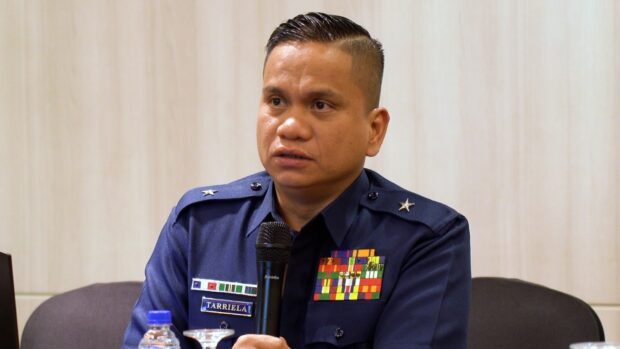
Commodore Jay Tarriela, Spokesperson for WPS, Philippine Coast Guard. (File photo by ARNEL TACSON / INQUIRER.net)
MANILA, Philippines — Commodore Jay Tarriela, spokesperson of the Philippine Coast Guard (PCG) for the West Philippine Sea (WPS), shrugged off the mudslinging of pro-China individuals whom he called “modern-day Makapili.”
“Makapili” is the acronym for the Makabayang Katipunan ng mga Pilipino (Patriotic Association of Filipinos), referring to the group of Japanese collaborators during the Second World War.
Tarriela became the prime target of these online attacks as he actively espouses the present administration’s hardline stance against China’s actions in the WPS.
“They seek to discredit our efforts by attacking the messengers’ credibility,” Tarriela said in a post on X (formerly Twitter) on Wednesday.
“Their tactics extend beyond labeling me as a tainted pro-American figure, delving into my past and referencing a case from my time at the Philippine Military Academy in 2004 to further erode my credibility,” he added.
READ: Teodoro tells Asean military veterans to watch out for expansionism
READ: Defense chief says China must show sincerity first before PH talks on WPS
READ: Teodoro blasts China’s ‘reversal of truth’ over claims on PH-US joint patrol
Tarriela also expressed indifference to such tirades during a National Defense College of the Philippines’ forum on Tuesday, saying: “I am not affected by their bashing.”
“There are a lot of media personalities asking about the social media posts made by these modern-day Makapili or paid trolls, and why am I not responding to them,” he said, speaking partly in Filipino.
“I don’t want to give them a platform, I don’t allow them to use my X account to respond to them [so] they will be noticed by my followers.”
Some media personalities, many of whom are supporters of former President Rodrigo Duterte, actively counter the government’s official account of China’s actions against Philippine vessels operating inside the western section of its exclusive economic zone.
The replenishment operation for the BRP Sierra Madre grounded at the Ayungin Shoal became the flashpoint of tensions between Manila and Beijing.
This year alone, the China Coast Guard (CCG) used military-grade lasers in February and a water cannon last August and November against Philippine boats supplying the commissioned World War II warship.
Tarriela noted that these activities were exposed, thanks to the PCG’s “transparency initiative.”
“They challenge factual accounts by presenting their own version of events, either creating a wholly new narrative or downplaying incident severity,” he said.
“For instance, in response to the military-grade laser incident, the Chinese ambassador held a press conference claiming that the lasers used by the China Coast Guard were harmless, likening them to laser pointers available for purchase online.”
“They also circulated their own footage insinuating that the Philippine Coast Guard vessels intentionally collided with their Chinese maritime militia, while spreading false claims about their use of water cannons against resupply boats,” he added.
China’s actions are in line with its assertion of sovereignty in almost the entire South China Sea, including most of the West Philippine Sea.
A 2016 ruling of the Permanent Court of Arbitration, however, effectively dismissed China’s sweeping claims while ruling in favor of the Philippines.
“We must remain vigilant in countering these disinformation campaigns by continuing to provide accurate information and involving the media to enhance public awareness,” Tarriela said.
“Only through these efforts can we expose the falsehoods and distortions perpetuated by the PRC to undermine our territorial integrity.”